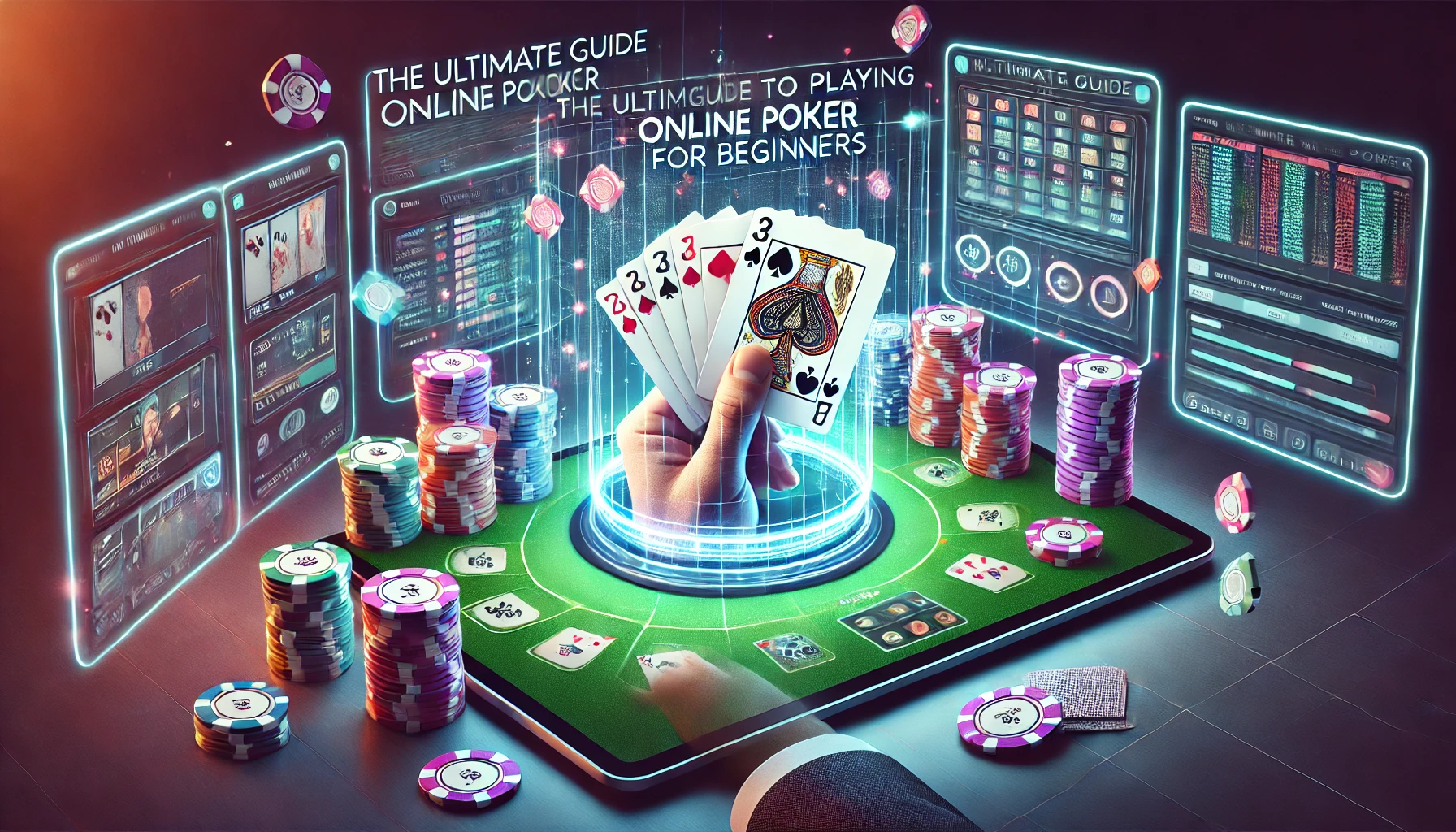The Ultimate Guide to Playing Online Poker for Beginners

Millions around the world enjoy playing online poker at their leisure, either playing high stakes tournaments or casual games from home.
But where do you start? We are here to answer all your questions regarding online poker, from the fundamentals of how it works to a guide comparing online poker to live poker. This ultimate guide will allow you to sit at the virtual table and play like a pro without being afraid, no matter whether you’re looking to put in time chasing big wins or merely simply hone your skills.
What Is Online Poker?
Online poker involves playing the classic card game for eons, in a digital format. Essentially a game of player against player, it’s both the most simple and the simplest of games, players competing to create the best hand or bluff their way to victory. Poker has brought you one step further thanks to internet and is now available for everyone to play with opponents from all over the globe anytime, anywhere.
Not all of the variations of online poker are endless but, Texas Hold’em, Omaha, and Seven Card Stud are some of the most popular ones. There’s something for everyone: beginner friendly games all the way up to high stakes tournaments with many platforms.
Another big difference between online poker and fast paced poker is the speed of play. Whereas granting the game a close feel to the likes of blackjack while at the same time leaving out its shuffling or dealing aspect, plays out faster, and offers the ability to play more than one table at once. Advanced software tools and tutorials make learning the game easier than ever, plus.
Online Poker Vs. Live Poker?
Online Poker and live poker might seem at first like two are the same on the surface; they play with the same rules, strategies, and goals. The experience playing them though can be very different.
Online Poker
- Speed: Places move much faster online too, with no need for manual shuffling or chip counting.
- Convenience: You don’t need to travel to a casino, you can play anytime, anywhere.
- Access to Tools: Players can benefit from online tools for hand tracking or poker odds calculators to help them improve their skills.
- Anonymous Gameplay: With no faces to see, bluffing may be a bit different.
Live Poker
- Atmosphere: They are hard to replicate online, live poker rooms are social interaction and buzz.
- Reading Opponents: During live games body language and facial expression can give valuable clues.
- Pace: Live poker is slower than poker online and therefore giving you the time to think and strategize.
Of course, both have their charm, and many people love switching between the two. For convenience and volume, online poker is great, but with a bit more thickness, live poker is fantastic. It really depends on whatever you choose: the only thing is that you should adapt your strategy and have fun!
How Does Poker Work?
Poker is a card game with a bit of luck and tons of skill, all mixed up with strategy. Players have to work together to make the best hand—or bluff their way to one—using the cards they’ve been dealt, and the others laid on the table. The ultimate goal? The total of all bets made during a hand, which is the pot, that is, which is won.
In poker, every round begins with players receiving their cards and then having the choice to bet, call, raise or fold based on the hands they have. From the start, betting rounds and finally a showdown happen in which community cards (depending on orientation) or betting rounds are revealed.
Poker is beautiful because you combine probability and psychology. In order to do this you’ll need to read your opponents, wise management of your chips, take risks at the right time and maintain a cool head under pressure.
How To Play Online Poker Step-by-step
Are you ready to get on with online poker? Follow these steps to get started with poker:
Step 1: Learn the Basics: Understand the hand rankings. The best (Royal Flush or A-K-Q-J-10 of the same suit) and the worst (High Card).
Step 2: Join a Table: Find and choose a platform on the internet to play poker, register, and find a table or tournament that works in your ability and budget. If you’re a beginner, you should find low stakes games.
Step 3: Get Your Cards: When playing, for example in Texas Hold’em, you will be dealt two (your “hole”) cards that are private to you. Think of these secrets—these are the foundations of your strategy.
Step 4: Start Betting: The game begins with two forced bets: the big blind and the small blind. Players then decide to:
- Call: Match the current bet.
- Raise: Increase the bet amount.
- Fold: If your cards aren’t strong, fall out of the hand.
Step 5: Watch the Flop: Three community cards are placed on the table by the dealer. Combining these cards with your hole cards you can have the best possible hand out of those you’re dealt.
Step 6: Continue Betting: Betting is carried out again and again. According to players’ chance in games, they assess what they have and what they want to do next.
Step 7: The Turn: Another betting round, and another fourth community card.
Step 8: The River: After the fifth and last community card is revealed, then there is the last betting round.
Step 9: The Showdown: Once the final bet has been made, if there is more than one player left, it’s time to reveal hands. Pot – the player with the strongest hand wins. This is your time of truth… if you’re bluffing!
Step 10: Rinse and Repeat: When the hand is over, the dealer hand moves in turn and begins the game anew.
What Are Winning Poker Hands?
In poker, the goal is to have the strongest hand on the table or at least act like it. Each hand is compared according to rarity and the fewer the better. Let’s break down the winning hands, from the most powerful to the weakest
- Royal Flush: You cannot beat this hand since this is the best poker hand! It has A, K, Q, J, and the 10 of one kind of suit. It is very scarce, and therefore, it is a sure bet.
- Straight Flush: Five cards of the same suit in an unbroken sequence (e.g. five of hearts: five, six, seven, eight and nine). In case more than one player has a straight flush, then the one with a high card will be the winner.
- Four of a Kind: Four cards of the same denomination, for instance four cards of nine. This hand is quite powerful and only a straight flush or royal flush will be able to beat this hand.
- Full House: Three cards of one value and 2 of another (for example three Kings and two 7s). Full houses are fairly frequent, but powerful in numerous circumstances since they can take the pot many times.
- Flush: Flush Five cards of a kind in any order, for example two, seven, nine, queen and king of spades. If two players have the same set of cards, then the player with highest rank card wins the game.
- Straight: Any five consecutive cards from the same set such as four, five, six, seven and eight. Gentles are the best hand that can beat all other hands most of the time.
- Three of a Kind: Three cards with the same face value, for instance three Aces. Still, it is a good hand to many games, and you will not always lose.
- Two Pair: Two sets of cards of the same rank, for example two 5s and two Jacks. If both the players have the same high pair, then the second pair is considered in order to declare who will win the game.
- One Pair: A set of two identical cards (for example two Queens). It is the weakest hand there is so don’t think that you can win the game with it!
- High Card: If none of the above rules apply, the card with the highest rank in your hand will decide your ranking. It’s not fancy but it can triumph where everything else is lost for words.
It is especially important in poker to know the hand rankings. The more you know about these types of combinations, the more easily you will be able to evaluate the probability of your own success in any given game.
What Makes a Good Starting Poker Hand?
In poker, the cards you’re dealt when you first sit down can determine the rest of your game. A good starting hand doesn’t guarantee a sure win, but it makes strategic plays as the hand goes forward. Here’s what to look for in a solid starting poker hand:
- High-Value Pairs: The dream starting hands are Aces (“Pocket Rockets”) or Kings (“Cowboys”). Right out of the gate, these strong pairs give you a great advantage.
- High Suited Connectors: Such cards as Ace-King or Queen-Jack in the same suit make strong combinations, i.e. straights, flushes or even straights flush, so you can’t miss those.
- Medium Pairs: The value of pairs is also pairs of 10s, 9s or 8s can actually be valuable, and especially if you hit a third card for a set on the flop.
- High Unpaired Cards: If you have ace queen or king jack hands, you get hold of promising cards. They aren’t as strong as a pair, but their ability to make a high pair or straight make them worth playing.
- Positional Considerations: It does not matter where you are at the table. From later positions, you can see how others are acting, and you would have a better hand like suited connectors or lower pairs.
It’s not just the good starting hand, but how you execute it. Weigh your cards as compared to those your opponents’ cards, and don’t be afraid to fold when things seem hopeless.
What Are Some Basic Poker Rules?
With poker being a game of skill, strategy and a sprinkle of luck, every successful poker player will learn the basics. Here’s a rundown of the core rules that every beginner should know:
Understand the Goal
The purpose of poker is to win the pot, that is, a sum of all bets placed in a hand. To do this you can either have the best hand at the showdown or you can talk other people into folding.
Learn the Betting Rounds
Poker games generally consist of four betting rounds:
- Pre-Flop: Players get their hole cards and then place their bets.
- Flop: Face up are dealt three community cards out of a deck.
- Turn: A fourth card is dealt to that community.
- River: The final community card is played.
In each round, players either bet, call, or raise, or just fold.
Hand Rankings Matter
The chance of winning depends on the value of your hand. See the poker hand rankings (ie. from Royal Flush to High Card) and see where you fall.
Blinds and Antes
In most poker games, there are mandatory bets:
- Blinds: The small and big blinds are posted up by the two players to the players left of the dealer.
- Antes: Each player will put in a small amount of money before the game begins.
Position is Key
The table you’re at affects your strategy. Being the last to act (on the “button”) means you have the advantage of seeing what other players do before you place your move.
Know When to Fold
A large part of poker is knowing when to cut your losses. Folding is not a failure, it’s strategic and will save you your chips for better opportunities.
Respect the Rules
Different poker variants have different rules, so learn what rules apply to the game you’re playing. Texas Hold’em, for example, is nothing like Omaha or Seven Card Stud.
Following these basic rules will give you a good underpinning for succeeding. Remember practice makes perfect, don’t be shy to practice in free games or low stake tables, as if you progress you never know you will end up there.
What Are Pot Odds?
In poker, pot odds are an important negotiating tool that enables the player to make better decisions during a hand. Simply put, pot odds compare the size of the current pot to the price of a call, so we can decide if we’re willing to give up a calling hand. Let’s break it down step by step:
The Basic Formula
Pot odds are calculated as a ratio:
Pot Odds = Size of the Pot : Cost of Your Call
For example, if the pot has $100 and you need to call $20 to stay in the game, your pot odds are 5:1.
Why Pot Odds Matter?
With pot odds you know if it is wise to chase your draw (such as a flush or straight). Comparing your pot odds to the odds o you can complete your hand (your outs) allows you to make educated choices.
Practical Example
Let’s say, for example, you are one card away from completing a flush. The odds of hitting your flush on the river are about 4:1. If the pot offers better odds—say, 5:1—it’s a good call. So, if not, might folding be the wiser choice?
Strategy vs. Intuition
Pot odds are important, but they’re not the whole story. Your decisions should also be influenced by factors such as your opponent’s behavior, your table position and the possibility of future bets.
How To Deposit and Withdraw Your Cash from Online Poker Sites?
Once you know the ropes of finding an online poker site that secures your finances, the process of managing your money is a breeze. We’ll walk through the steps to deposit and withdrawal your cash in a secure and efficient manner.
Depositing Funds
Here’s how to fund your account and hit the tables:
- Create an Account: Get signed up at a legitimate poker site and verify with them.
- Navigate to the Cashier: Ideally, there is a “Cashier” or “Banking” section on most platforms, where your transactions will be processed.
- Choose a Payment Method: With a selection of options such as credit/debit card, e-wallet (PayPal, Skrill), prepaid card, bank transfer, etc.
- Enter the Deposit Amount: See how much you should add to your account. If it’s your first time, then be wise and choose minimum deposit limits, and look to start small.
- Confirm the Transaction: Make your deposit by following the instructions. Usually funds are available instantly.
Withdrawing Winnings
Cashing out your winnings is just as straightforward:
- Go to the Cashier: Go back to the Cashier section of the site.
- Select Withdrawal: You then choose the “Withdraw” option and select which payment method you’d like to withdraw with.
- Enter the Amount: Decide how much you want to cash out. Check the details, some sites have minimum withdrawal limits.
- Verify Your Account: Most sites require ID verification before they’re willing to process withdrawals.
- Wait for Processing: Withdrawals can sometimes take a few hours and sometimes a few business days depending on the method.
Tips for Smooth Transactions
- Use Trusted Sites: Keep your funds safe and stick to proven and licensed poker platforms.
- Know the Fees: Some of the payment methods charge fees, choose wisely.
- Set Limits: If bankroll management is something you take seriously, keep track of your deposits and withdrawals.
Conclusion
Online poker is a game that rewards you not only for skill, but also luck in just the right amounts. The first few steps can be daunting for beginners with such many hands, strategies, and rules to remember! Don’t worry, every poker pro started from this point.
The trick is to take it one step at a time. Learn the basics, practice regularly and never be afraid to dive into things like this guide to polish up your skills. Begin minimal, set reasonable restrictions, and concentrate on enhancing one handle at one time.
Therefore, pick up your deck (or log in on your favorite platform), and be prepared for the cards to drop where they please. Poker isn’t just a game – it’s a life lesson and your own personal journey, just getting started!





